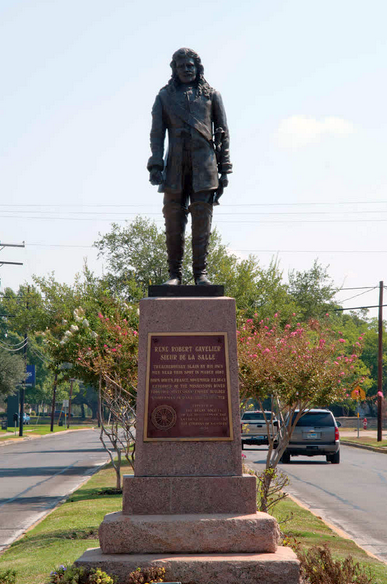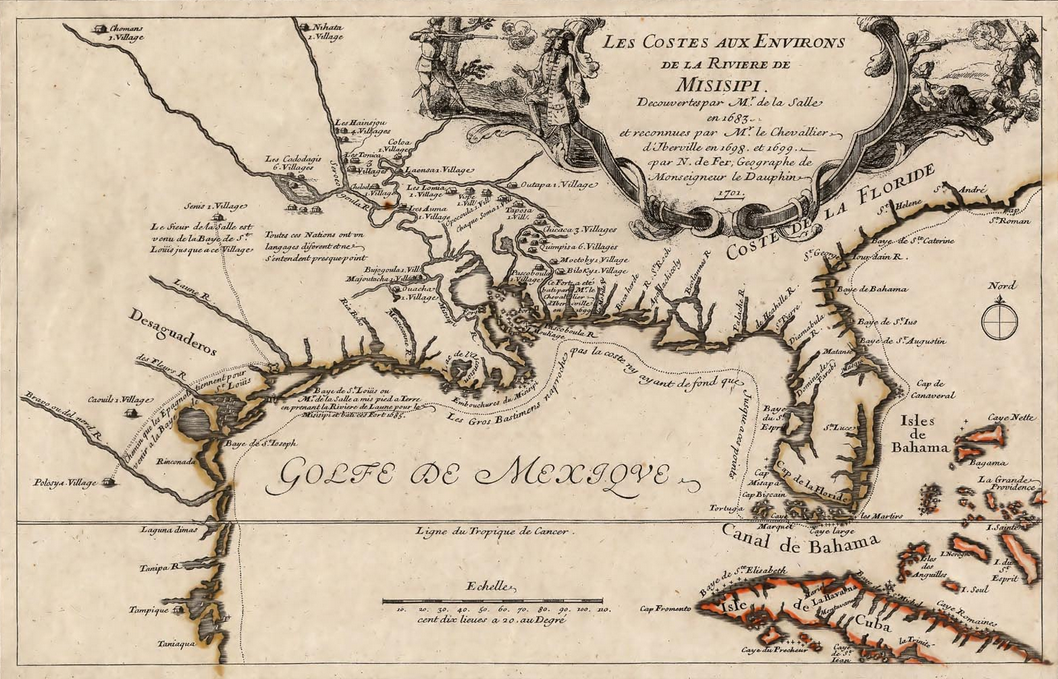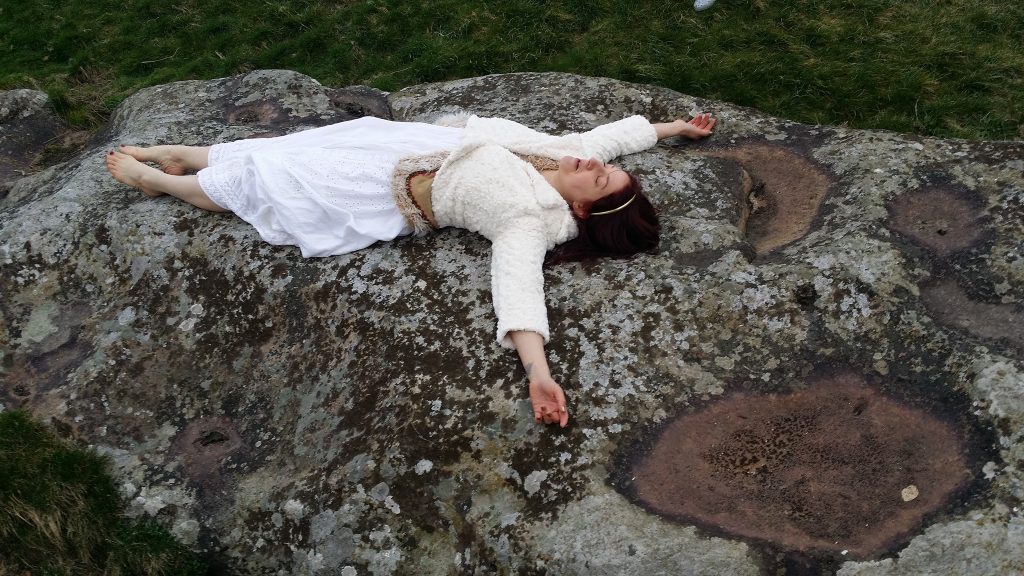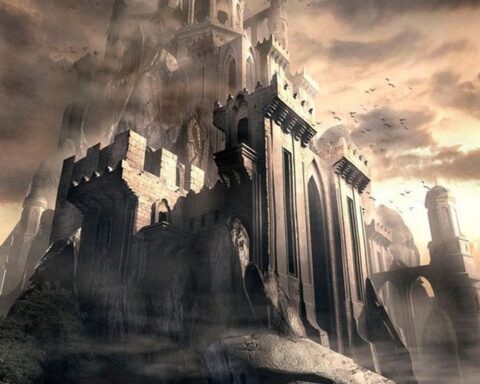Editor’s note: The following is extracted from Famous Discoverers and Explorers of America, by Charles H. L. Johnston (published 1917). All spelling in the original.
Undaunted, the explorers passed down the water-course on sleds, down the Illinois to Lake Peoria, and thence to the muddy waters of the Mississippi. They had a peaceful passage southward, hunting much and fishing in the stream, and eventually arrived at the Chickasaw Bluffs. Here redskins were met with, who gave them kind treatment, and, pushing on, the little party soon arrived at a mighty village of the Arkansas Indians.
These redskins were a frank and open-hearted people of gentle manners, and very hospitable. The Sieur de La Salle was treated with marked deference and respect. He took possession of the country in the name of the King of France, erected a cross, and adorned it with the arms of his native country. This was done with great pomp and ceremony, the savages believing that it was a ritual for their amusement. Two weeks were pleasantly spent among the red men and then the voyagers kept on their way.
The journey to the mouth of the mighty water-course was easy and pleasant. Many Indian tribes were met with, but no battles occurred. Finally, on the 6th day of April, the river was observed to divide itself into three channels, so the Sieur de La Salle separated his company into three divisions and, putting himself at the head of one of them, he took the western channel, the Chevalier de Tonty the middle, and the Sieur Dautray the eastern. The water soon became brackish, then salt, until, at last, the broad ocean opened up before them. La Salle encamped for the night about twelve miles above the mouth of the western branch, and the next day he and Tonty examined the shores bordering on the sea in order to ascertain the depth of the waters in the two principal channels. The day following was employed in searching for a dry place, removed from the tide and the inundation of the rivers, on which to erect a column and a cross. Next day this ceremony was performed.
All the Frenchmen were drawn up under arms, while a column was erected with this inscription:
“Louis the Great, King of France and Navarre, reigns; the 9th of April, 1682.”
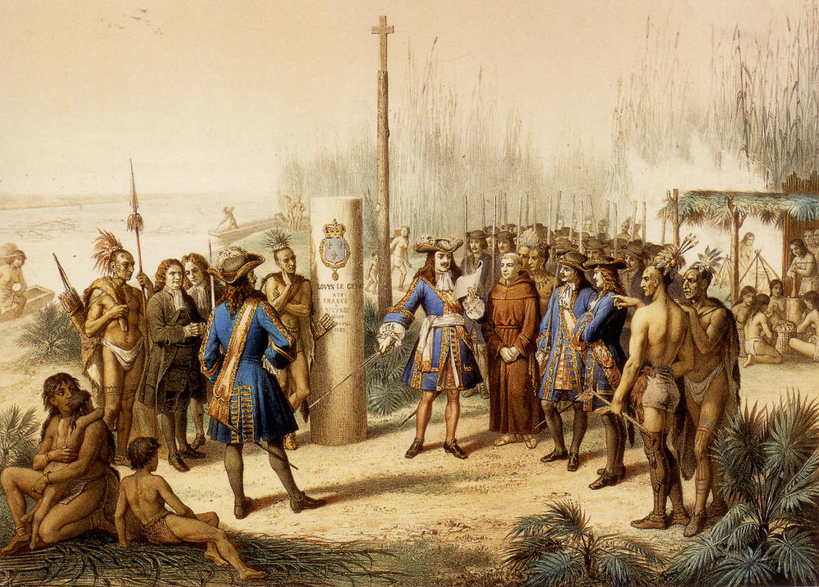
The Te Deum was now chanted and the soldiers discharged their muskets with shouts of Long Live the King! La Salle then made a formal speech, taking possession of the whole country of Louisiana for the French King, the nations and people contained therein, the seas and harbors adjacent, and all the streams flowing into the Mississippi, which he called the great river St. Louis. A leaden plate was then buried at the foot of a tree, with a Latin inscription, containing the arms of France and the date, and stating that La Salle, Tonty, Lenobe, and twenty Frenchmen were the first to navigate the river from the Illinois to its mouth. The cross was then erected with appropriate ceremonies. At the same time an account of these proceedings was drawn up, in the form of a Proces Verbal, certified by a Notary and signed by thirteen of the principal persons of the expedition.
La Salle felt happy, for he had seen, he had come, he had conquered!
Although the journey up the Mississippi was without danger, La Salle, when he reached the upper courses, was seized with a dangerous illness which made it impossible for him to go forward for forty days. The Chevalier de Tonty was dispatched to Mackinac in order to inform the Count de Frontenac of the particulars of the voyage, and then, by slow stages, La Salle reached the Miami River, where he arrived by the end of September.
Tonty was faithful and accurate in executing his orders, so faithful that, shortly afterwards, when La Salle was well enough to sail for France, he left him in charge of all his interests during his absence.
The explorer met with a favorable reception in the old world, and it was decided that an expedition should be fitted out, for which the Government should provide vessels, troops, munitions, and such other supplies as were wanted: the whole to be under his command. He was authorized to establish colonies in Louisiana, and to take command of the immense country and all of its inhabitants from Lake Michigan to the borders of Mexico. He was given four vessels and was furnished with two hundred and eighty men.
Certainly his own government thought well of him, even if other people did not, so he and his men started for the Gulf of Mexico, determined to there found a colony which would perpetuate the name of France for all time in the Western Hemisphere.
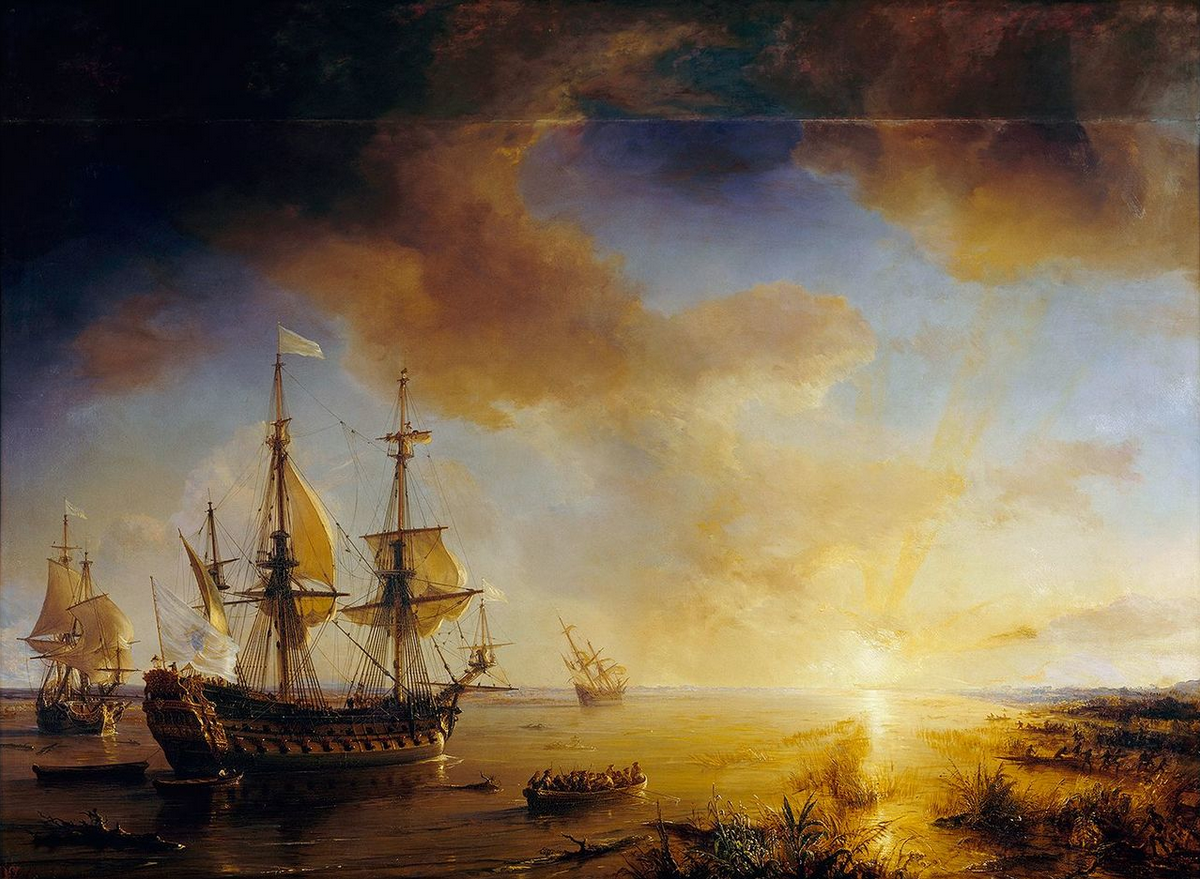
The history of this expedition is an unfortunate one. In four vessels the adventurers crossed the ocean, intending to land at the mouth of the Mississippi. There were about two hundred and eighty persons in all, including many missionaries and soldiers, the latter being an assemblage of vagabonds and beggars from the streets, some of whom had never handled a musket. The vessels touched at the island of Santo Domingo, then crossed over into the Gulf of Mexico, heading, as all thought, for the mouth of the Mississippi. But such was not the case, and the explorers touched land near the borders of Mexico, at the Magdalen River, where the soil was barren and sandy, and where there was little game.
At different times, parties landed, hunted the wild buffalo, and explored the flat and somewhat desolate country. They constructed a fort with the timbers and planks of one of their ships, which floated ashore after the vessel went to pieces, and also with drift wood from the beach. After this was done, the Sieur de La Salle, taking fifty men with him, set out on a tour of discovery, finding a flat game-filled country and a noble river which he called the Vaches, because of the great numbers of wild cows, or buffaloes, seen upon its banks. This name it still retains.
After a journey of considerable length, the Chevalier returned, built a new fort, and then set out upon another journey of discovery. Many of his men died of exposure and rattlesnake bites, but this never disturbed the even calm of his manner. He pressed on, found the great Colorado River, and crossed it, penetrating into the wilderness for many miles. After an absence of more than four months, La Salle was again received with joy by the colonists at the fort. His men were ragged in dress, some without hats, and all were haggard and worn by exposure.
The Indians had always shown themselves to be hostile and had murdered several of the French explorers when they had strayed away from their companies. Of the four vessels which had brought over the expedition, three had returned, and the last, the la Belle, had been destroyed by a storm. The Sieur de La Salle was thus cut off from all supplies in a new country, two thousand miles from any civilized settlement to which he could look for succor, and surrounded on every side by hostile savages. It is no wonder that many of his followers were dissatisfied and miserably unhappy, some even plotted to kill their great and gallant leader.
Of the many expeditions which I have taken into the wilderness, with parties of men, none has ever been tranquil throughout. There is always some evil dispositioned fellow along, who raises a disturbance, makes others unhappy, and, by his surly manner, creates uneasiness and distrust, so that all are happy when the settlements have been reached and the malcontents have been allowed to go their ways in peace. So it was here. There were several Frenchmen of a jealous and mean disposition, who, feeling ill-humored because of their hardships in the wilderness, felt it their duty to murder the only true man among them all: the valiant leader. It was easy to succeed in their evil design.
Somewhere on the Mississippi River was the Chevalier Tonty, the staunch friend and companion of La Salle, and a man who was as brave and as valiant as this courageous Frenchman. Why not go in search of him? The proposition was a good one, and La Salle determined to take only the bravest and the strongest; to travel eastward; to reach the Mississippi, and to there find, if possible, his brave and noble companion-in-arms.
This was a wonderful trip. The valiant Frenchman and his companions crossed unknown rivers, broad prairies, and flat plateaus. A crocodile seized one of the soldiers by the leg and dragged him to destruction, in one instance; in another, several of the French adventurers were badly gored by buffalo.
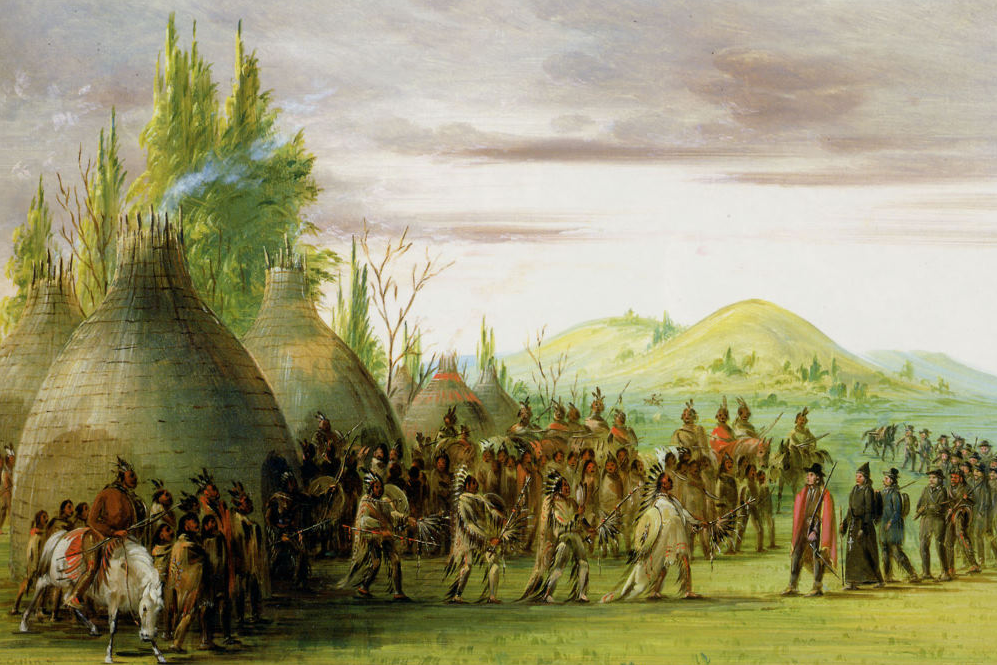
La Salle finally reached the land of the Cencis Indians, the future home of many a Daniel Boone, a perfect paradise for the sportsman and a land of noble rivers, beautiful valleys, and much wild game. He was charmed with it, he reveled in its scenery, its beautiful valleys, its wonderful water courses, yet, here it was that he was to meet his end, an event as sad and tragic as any of the great events of American history.
On the 15th day of March, 1687, the adventurers came to a place where the Sieur de La Salle had buried a quantity of Indian corn and beans on his last journey, and he ordered his followers, Duhaut, Hiens, Liolot, Larcheveque, Teissier, Nika, and his footman Saget, to go and bring it away. They found the place, but the corn and the beans were spoiled. Nika was fortunate in killing two buffalo, and the others dispatched Saget to inform the commander of this fact, and requested him to send horses for the meat. La Salle, consequently, directed Moraquet, De Marie, and Saget to return with horses and to send back one of them loaded with the flesh of the buffalo, for immediate use, and to wait until the rest was dried.
Moraquet arrived, found that the meat had been smoked, though it was not dry enough for this process, and Duhaut and the others had laid aside certain parts to be roasted for themselves, which, it seems, was the custom on similar occasions. Moraquet, in a passionate manner, reprimanded them for what they had done, and took away, not only the smoked meat, but the pieces which they had reserved, saying, in a menacing tone:
“Comrades, I will do with it as I please!”
This irritated the rest. Duhaut had an old grudge against Moraquet, and was quite ready to take revenge. He brought over Liolot and Hiens to help him accomplish his purpose, and finally the others, and they determined to murder Moraquet, Nika and Saget. In the night, when the unsuspecting victims were asleep, they were butchered with an ax.
The bloody work had commenced, why not let it continue? The conspirators laid a scheme, on the spot, to destroy the Sieur de La Salle. They would shoot him.
Meantime, the courageous leader of the expedition expressed anxiety at the long absence of Moraquet, and seemed to have forebodings of some unhappy event. He feared, indeed, that the whole party might have been cut off by the savages. He determined, finally, to go in search of them, leaving the camp on the 19th day of March, in charge of Jontel. With Father Anastase, and two natives who had served him as guides, he started out to look for his companions in arms.
The valiant French explorer traveled for about six miles, when he found the bloody cravat of Saget, one of the murdered men, near the bank of a river, and, at the same time, two eagles were seen hovering over their heads, as if attracted by food somewhere on the ground.
La Salle thought that the party must be near, and fired his gun to draw the attention of those whom he wished to find. Duhaut and Larcheveque immediately came across the river and advanced to meet him. La Salle approached, saying:
“Where is the good Moraquet? Has anything happened to him?”
“He is along the river,” answered Larcheveque.
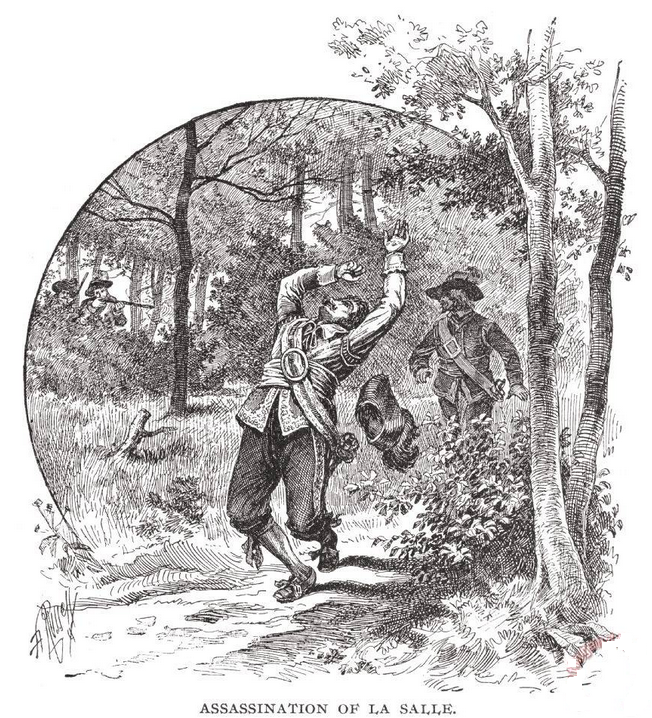
At that moment, Duhaut, who was concealed in the high grass, discharged his musket, and shot the unsuspecting Chevalier through the head. He fell forward upon his face, and Father Anastase, who was standing at his side, expected to share the same fate, until the conspirators told him that they had no design upon his life.
La Salle lived for about an hour, unable to speak, but continually pressed the hand of the good priest to signify that he understood what was said to him. Finally he passed away, and was buried by the kind father, who shed tears over the body of this brave and valiant adventurer.
Thus perished the wise Chevalier: generous, engaging, adroit, skillful, and capable of any accomplishment. He died in the full vigor of life, in the midst of his career and his labors, without the consolation of having seen the results of his great explorations. In some of the higher attributes of character, such as personal courage and endurance, undaunted resolution, patience under trials, and perseverance in contending with obstacles and struggling through embarrassments that might appall the stoutest heart, there is, I believe, no man who surpassed this Sieur de La Salle. He was cool and intrepid at all times, never yielding for a moment to despair, or even to despondency, and he bore the heavy burden of his responsibilities manfully until the end. To him and to good Father Marquette must be mainly ascribed the discovery of the vast regions of the Mississippi Valley and its subsequent occupation and settlement by the French. His name must therefore always hold a high position among those adventurous souls who struggled to conquer, to colonize, and to explore the vast American Continent, when it was a wilderness inhabited by wild men and wild beasts, and unknown to those of a white complexion.
